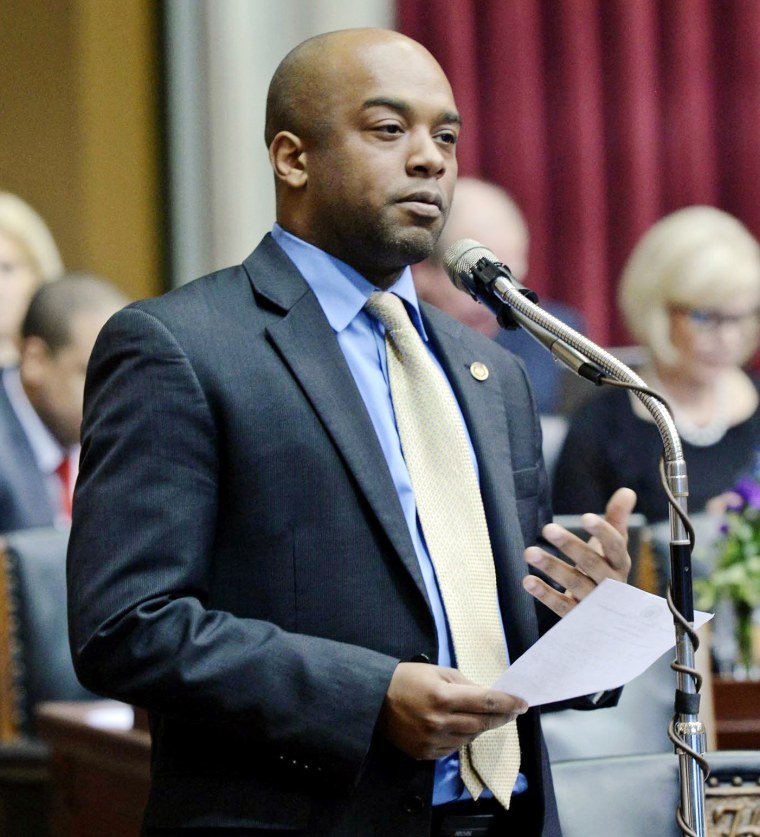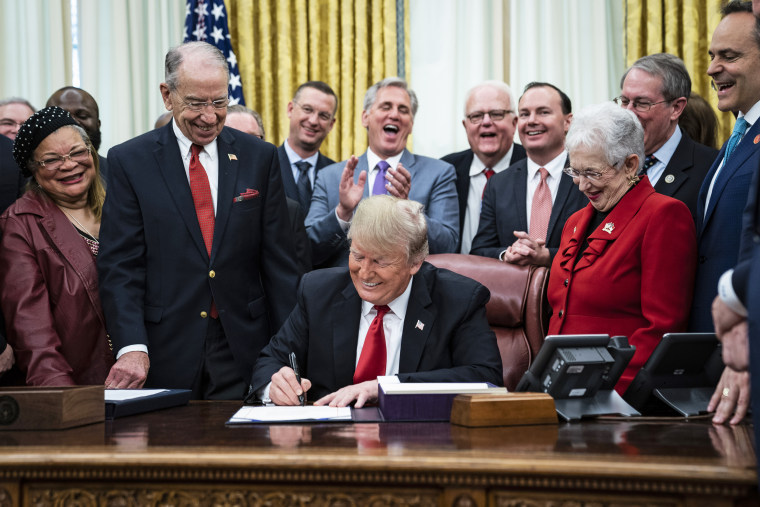1000’s of nonviolent federal prisoners eligible for early launch below a promising Trump-era legislation stay locked up almost 4 years later as a consequence of insufficient implementation, confusion and bureaucratic delays, prisoner advocacy teams, affected inmates and former federal jail officers say.
Even the Biden administration’s try to offer readability to the First Step Act by figuring out certified inmates after which transferring them into house confinement or one other type of supervised launch seems to be falling quick, in response to prisoner advocates aware of the legislation.
The Division of Justice was tasked with finishing up the legislation by the federal Bureau of Prisons, however the bureau director, Michael Carvajal, a Trump administration holdover, introduced his retirement in January amid criticism of a crisis-filled tenure marked by company scandals. No substitute for Carvajal has been named, and legal justice advocates contend that for the bureau to permit even one particular person to be incarcerated past what’s permitted below the First Step Act exposes ongoing failures.
“It shouldn’t be this difficult and it shouldn’t take this lengthy,” mentioned Kevin Ring, president of the nonprofit advocacy group FAMM, also referred to as Households Towards Obligatory Minimums. “Right here we’re, 4 years later, and it’s maddening.”
The Justice Division revealed a last rule in January that implements an integral characteristic of the legislation by which inmates can earn so-called time credit, that are obtained by participation in jail and work applications and calculated as a part of the method of getting out early.
The issue, advocates say: They’re figuring out inmates whose time credit aren’t getting utilized, and in some circumstances, the inmates aren’t getting launched as early as they need to be.
Courtney Curtis, a former Missouri state lawmaker who was sentenced final 12 months to 21 months in federal jail for wire fraud associated to the misallocation of marketing campaign funds, mentioned in a letter shared with NBC Information that his time credit haven’t been adequately counted after taking part in applications reminiscent of “Be Profitable,” “Drug Training” and “Discuss to your Dr.”

Curtis, 41, who’s being held within the Federal Correctional Establishment Elkton in Ohio, mentioned he hasn’t had his time credit added since January, and in the event that they had been, he believes he would have been launched in early June. His present launch date is Oct. 22.
“As one of many many inmates that profit from the FSA,” he wrote, referring to the First Step Act, “I’ve made strides to take courses, work and keep productive, however the BOP and its systemic manner of working inefficiently have stymied my potential to take probably the most quantity of courses in an orderly style as prescribed within the FSA or to launch me as quickly as I ought to’ve been … I can solely surprise if that is by design, and what the entire extent of impacted inmates is.”
The Justice Division declined to touch upon Curtis’ case, citing privateness causes.
Information offered by the Bureau of Prisons exhibits that as of June 18, greater than 8,600 inmates have had their sentences recalculated and are slated for launch with the applying of their time credit. However it’s unclear what number of certified inmates are entitled to have been launched early however stay incarcerated.
In a response, bureau officers mentioned “We now have no information which suggests inmates had their launch dates delayed.”
However with the bureau’s personal information figuring out about 66,600 inmates who’re eligible to earn time credit, some business specialists disagree.
“We estimate that there are millions of inmates who won’t obtain the total profit — days off of their federal jail sentence — of the First Step Act just because the company is unsure methods to calculate these advantages,” mentioned Walter Pavlo, president of the consulting agency Prisonology LLC, whose specialists embody former Bureau of Prisons case managers, wardens and sentence computation professionals.
Calculating time credit
Holly Harris, a longtime Republican strategist who pushed for passage of the First Step Act as head of the nonpartisan Justice Motion Community, mentioned the change in administrations is not any excuse for a gradual rollout.
“Not solely that, however the Biden administration ran on legal justice reform, and now we are able to’t get solutions for something,” she mentioned, including that she hopes Carvajal’s substitute will “dig in rapidly and prioritize these people who’re simply languishing in jail needlessly to the pointless expense of the taxpayer.”
In 2018, then-President Donald Trump signed the bipartisan First Step Act as a method to scale back recidivism and ease the federal jail inhabitants, which has fallen in recent times however nonetheless consists of greater than 140,000 inmates presently in custody. Particularly, the legislation’s supporters consider it could actually minimize notably harsh sentences for nonviolent drug offenders and reduce the racial disparities affecting individuals of coloration within the legal justice system.

Inside the legislation’s first 12 months, greater than 3,000 inmates had been launched from jail early, in response to the Justice Division, with the entire now greater than 7,500 inmates. An inmate’s eligibility is measured by an algorithm often known as the Prisoner Evaluation Instrument Focusing on Estimated Threat and Wants, or PATTERN, scoring them in several classes, together with their historical past of violence and whether or not they’ve been concerned in critical incidents whereas incarcerated, to find out if they could re-offend. As a way to acquire time credit for early launch below the First Step Act, inmates have to be at a “minimal” or “low” danger of re-offending and never have been convicted of sure critical crimes.
Time credit are granted based mostly on an inmate’s participation in jail and work applications over a 30-day interval associated to anger administration, psychological well being, monetary literacy and different subjects that search to deal with habits and instill private expertise. As soon as the credit are calculated and it’s decided these credit equal the time left on the sentence, the inmate may be transferred out of jail into “pre-release custody,” reminiscent of a midway home or house confinement. Some may additionally be eligible for supervised launch like probation.
However prisoner advocacy teams say the supply of those rehabilitation applications varies broadly relying on the jail, which implies some inmates merely can’t entry sufficient earned time credit. The state of affairs has worsened due to staffing shortages amid the Covid pandemic.
As well as, some inmates say, even when they’ve taken the suitable courses, their time credit aren’t being frequently calculated, probably delaying their potential to get launched sooner.
The Justice Division’s last rule additionally permits for time credit to be counted retroactively for any jail and work applications inmates participated in after the First Step Act turned legislation in 2018. However Pavlo mentioned the Bureau of Prisons by no means had the mechanisms in place to adequately monitor inmates’ participation and he’s involved the company “just isn’t facilitating the well timed calculation and utility of time credit in accordance with the ultimate rule, forcing inmates to serve custodial phrases longer than required.”
Within the circumstances he’s reviewed, he mentioned he has seen inmates in jail from six months as much as a 12 months who might have had both an earlier launch or time in pre-release custody.
“The largest drawback is no person on the entrance traces appears to grasp the brand new rule,” Pavlo mentioned. “There must be a process drive on this now.”
Revising the algorithm
The Justice Division mentioned it’s persevering with to guage its use of the PATTERN algorithm after considerations by advocates that some danger classes that the device examines are believed to exacerbate racial disparities. The company’s statistics revealed in November discovered that about 55 p.c of white inmates had been categorised as “minimal” or “low” danger for recidivism in comparison with about 28 p.c of Black inmates.
In its 2022 annual report analyzing the effectiveness of the First Step Act, the Justice Division mentioned it was implementing one other up to date model of PATTERN “in an effort to mitigate towards varied racial and ethnic disparities related to prior danger stage classes.”
However Jim Felman, a Florida legal protection legal professional who has examined the First Step Act, mentioned extra transparency is required about how the algorithm is being tweaked to make sure that prisoners of coloration aren’t at a drawback, notably since Black individuals and Latinos stay overrepresented in U.S. prisons.
The federal authorities has “proven the world how we lead in imprisonment, however we are able to additionally present the world methods to lead in getting individuals out,” he mentioned. “Why wouldn’t we let each mathematician on the planet see our information so we are able to consider how racist any new model of the device could be?”
The Bureau of Prisons reiterated in an electronic mail that Legal professional Common Merrick Garland has “directed the continued examine of the device to enhance the equitability, effectivity, and predictive validity of the chance evaluation system.”

The frustration has been felt by former incarcerated prisoners like Dianthe Brooks, 52, who in 2018 obtained a four-year sentence after pleading responsible to wire fraud in a million-dollar kickback scheme.
She mentioned she was launched early from jail in Danbury, Connecticut, to house confinement in 2020 as a result of she has underlying medical situations that put her at larger danger for Covid. However it wasn’t till her time credit had been recalculated in January below the Biden administration’s renewed efforts that her ankle monitor was eliminated. She believes that will have occurred in June 2021 based mostly on her time credit if this system had been operating as meant.
Now, Brooks is advocating on behalf of different inmates at Danbury and throughout the nation to make sure they perceive their rights below the legislation.
“It’s nonetheless obscure how they’re calculating time,” she mentioned. “No person may give you a handbook for listed here are the courses that qualify, the credit score you’ll get and right here’s how they’re utilized. That doesn’t exist. So how do I even know if my time was calculated accurately?”

One other former Danbury inmate and prisoner advocate, Alice Phillips, mentioned she was stunned to be taught that after working within the jail grounds crew, the handbook labor finally didn’t qualify for time credit. She mentioned she was given no steerage by the jail, aside from being instructed in December 2019 that she was a minimum-risk offender eligible below the First Step Act.
Phillips, 56, who obtained a two-year sentence in 2019 after she was convicted of wire fraud associated to an actual property scheme, was additionally launched to house confinement in 2020 due to the Coronavirus Assist, Reduction and Financial Safety Act. She mentioned she continued to work throughout house confinement in prison-approved jobs, however these time credit had been by no means counted as they’d be now, leaving her probationary interval to final till 2024, as a substitute of 2023.
Jail officers at Danbury declined to remark about particular inmate allegations, however mentioned in an announcement that they convey “important data” in a number of methods, together with by laptop bulletins, one-on-one program overview appointments and city corridor conferences, and “every inmates’ launch date is calculated in accordance with federal statutes.”
However Phillips believes the First Step Act hasn’t lived as much as its promise for everybody.
“I behaved. I did the work. I certified for these credit,” she mentioned. “I’m not free, however I might be free sooner.”

